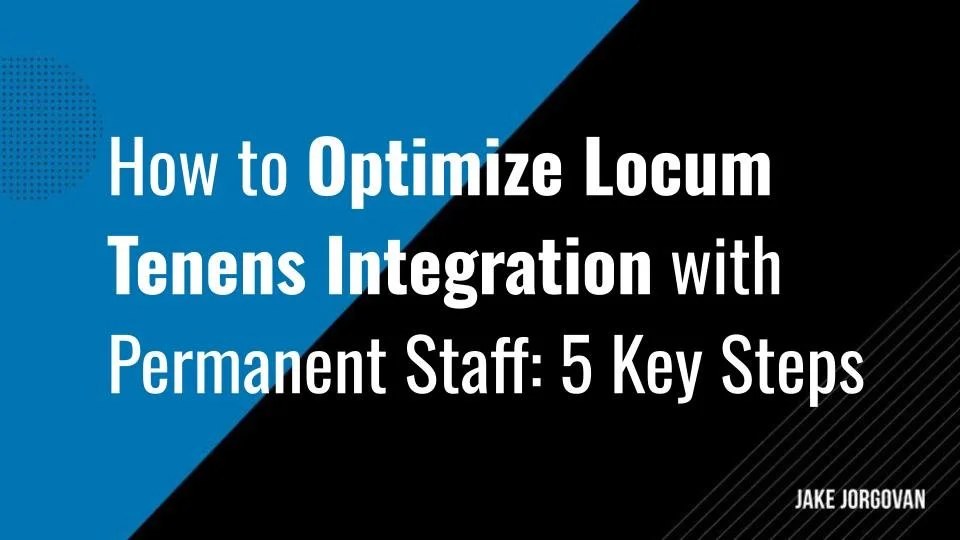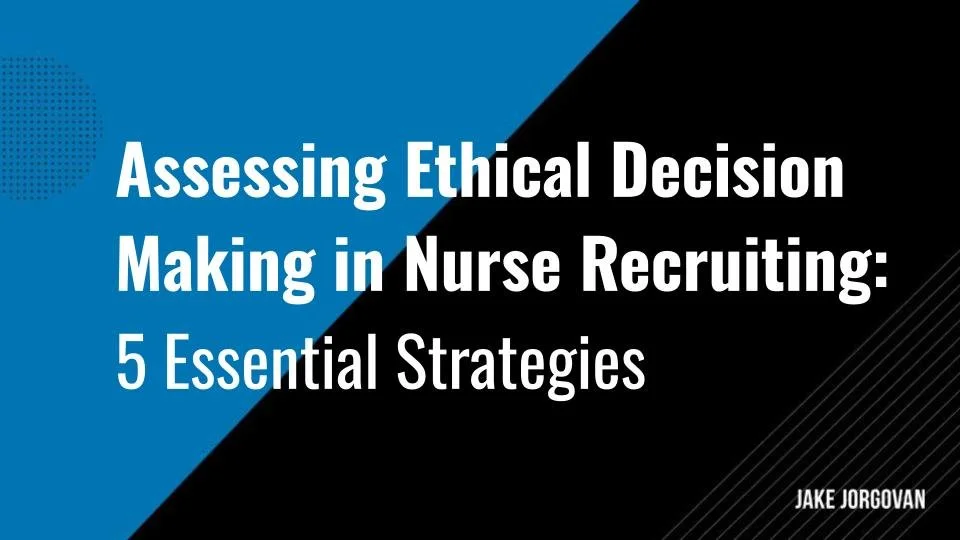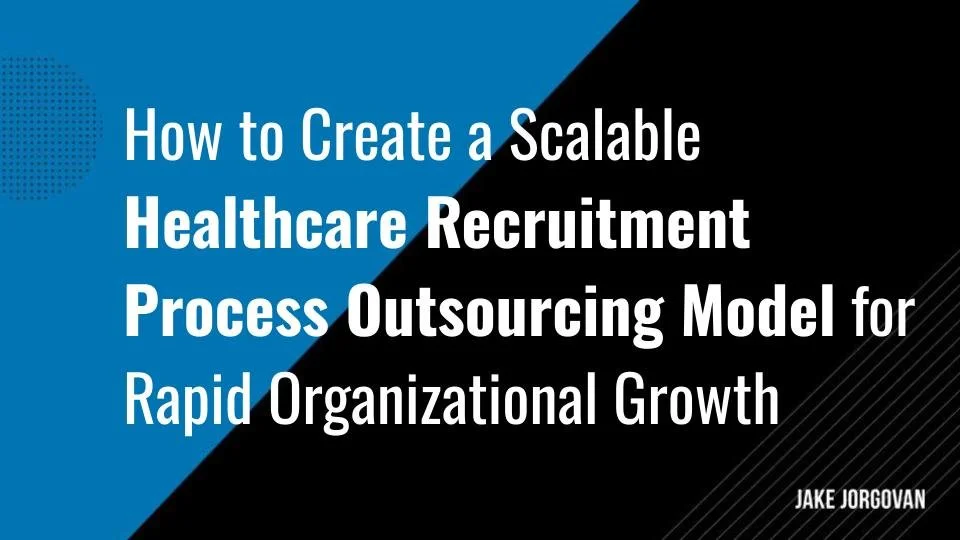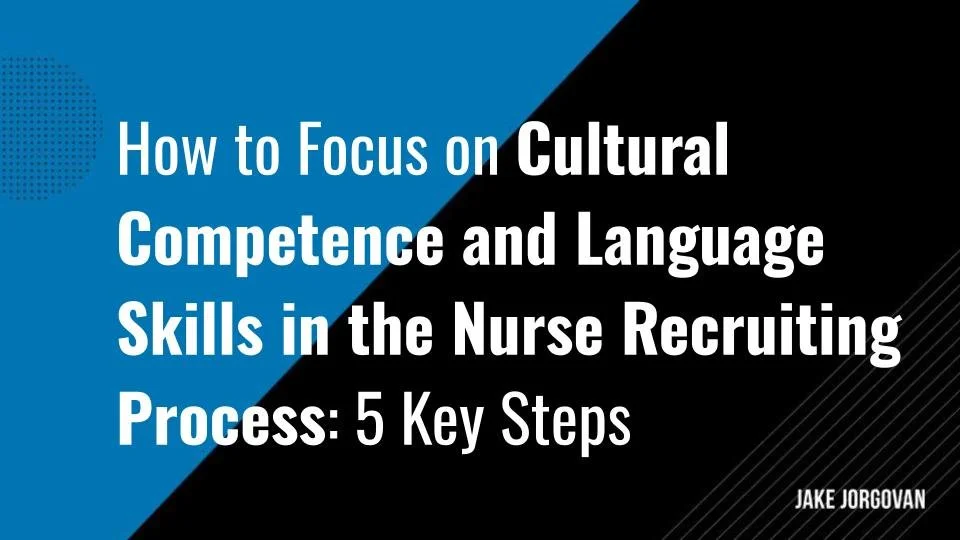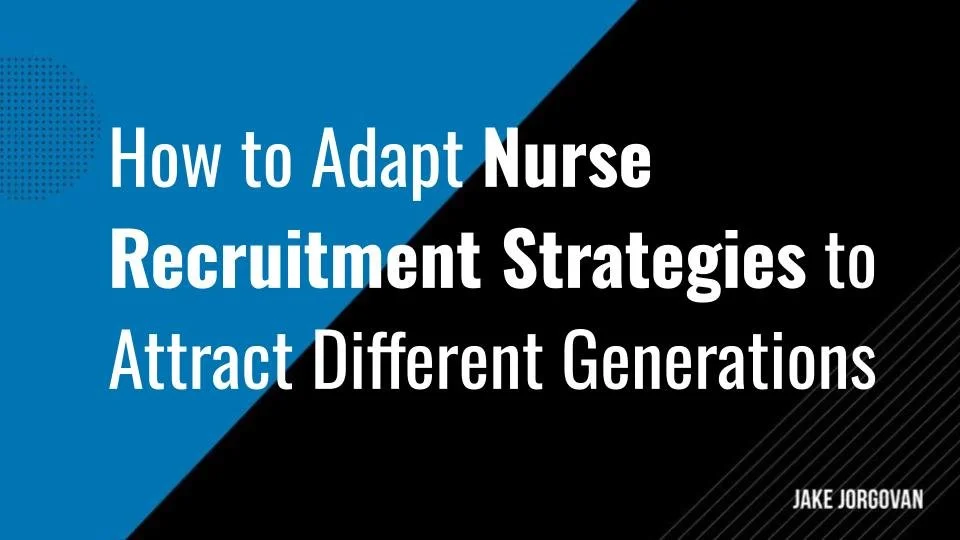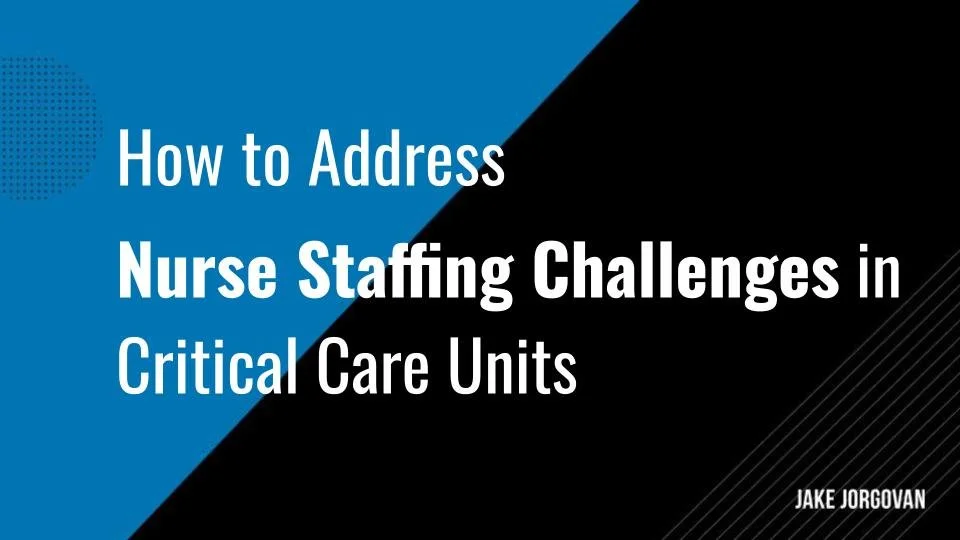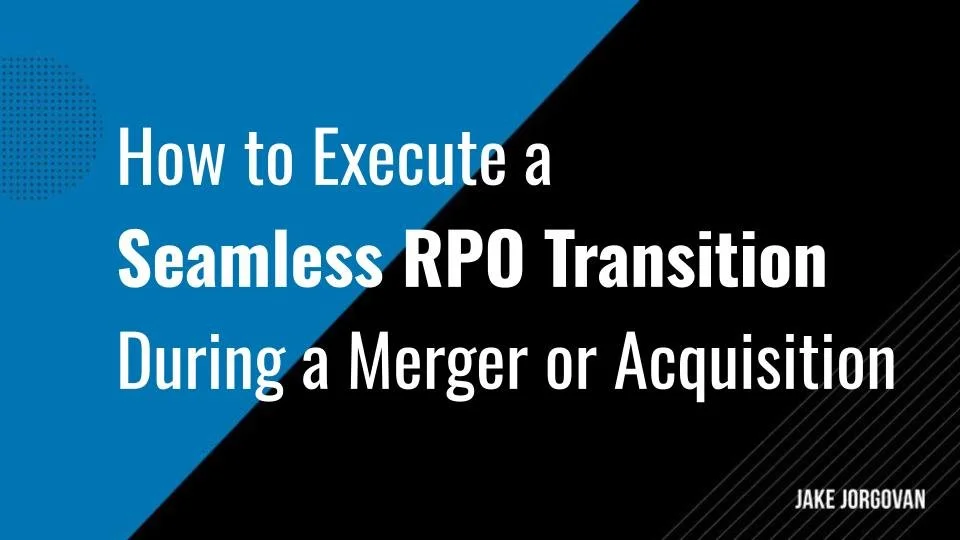Top Healthcare RPO Trends for 2025: Key Changes to Expect
Healthcare recruitment process outsourcing stands at a transformative juncture, driven by rapid technological evolution and shifting market demands.
This dynamic backdrop necessitates an agile approach to talent acquisition, emphasizing the importance of aligning with emerging trends.
As we look toward 2025, understanding these shifts is not just beneficial; it's necessary for those intent on leading in healthcare recruitment.
In this article, we delve into the trends poised to redefine healthcare RPO, offering a roadmap for those ready to adapt and thrive.
Let’s begin.
Technological Advancements
Artificial Intelligence and Machine Learning
In 2025, AI and machine learning will revolutionize healthcare RPO by enhancing precision in candidate-job alignment and significantly curtailing hiring cycles.
These technologies enable predictive analytics to foresee recruitment needs, ensuring that healthcare facilities are optimally staffed in a constantly evolving sector.
Integration of AI and ML in healthcare recruitment process outsourcing is set to transform how candidates are sourced, evaluated, and hired:
Streamlined Recruitment Processes: AI algorithms in recruitment automate and refine the screening of resumes, evaluating candidates against complex criteria swiftly, reducing the administrative burden on recruiters.
Enhanced Candidate Matching Accuracy: Machine learning models analyze historical hiring data and ongoing job performance to improve the precision of candidate-job fit. This technology adapts to subtle shifts in job requirements and candidate availability, ensuring high compatibility.
Reduced Hiring Times: By automating initial screening and administrative tasks, AI significantly cuts down the time from job posting to offer acceptance. This allows healthcare organizations to fill positions faster, maintaining operational efficiency even during critical hiring phases.
These advancements collectively ensure a more efficient, accurate, and responsive recruitment system, meeting the rapid pace and specific demands of the healthcare sector in 2025.
Blockchain Technology
By 2025, blockchain technology in healthcare RPO will enhance data security, ensure transparency, and improve system interoperability.
Its decentralized nature will allow for verifiable and tamper-proof records, streamlining credential verification and reducing fraudulent activities in recruitment processes.
Blockchain technology will significantly impact healthcare RPO through its robust applications:
Improved Data Security: Blockchain provides a secure platform where candidate data and credentials are stored with encryption, safeguarding against breaches and unauthorized access.
Enhanced Transparency: Each transaction on a blockchain is recorded on a public ledger, offering clear audit trails. This transparency boosts trust in the recruitment process, ensuring all actions are verifiable and above board.
Greater Interoperability: Blockchain facilitates the seamless exchange of information across different healthcare systems without compromising data integrity. This interoperability is vital for quick verification of credentials and past employment records, streamlining the hiring process across borders and institutions.
These blockchain capabilities not only optimize recruitment logistics but also reinforce compliance with stringent healthcare regulations regarding data handling and privacy.
Operational Trends
Remote Recruitment and Virtual Onboarding
Remote recruitment and virtual onboarding will become standard in healthcare RPO, leveraging advanced digital tools to manage hiring processes from anywhere.
This shift facilitates global talent access and expedites integration, enhancing organizational agility and responsiveness in a competitive market.
By 2025, the evolution of remote recruitment and virtual onboarding will reshape healthcare RPO with key operational shifts:
Global Talent Pool Access: Organizations will tap into a worldwide candidate base, not limited by geographic constraints, enhancing the diversity and expertise of the healthcare workforce.
Digital Onboarding Platforms: The use of sophisticated digital onboarding tools will streamline the integration process for new hires, delivering necessary training and resources efficiently, regardless of physical location.
Adaptive Recruitment Strategies: Recruitment strategies will adapt to include asynchronous interviews and virtual assessments, making the hiring process more flexible and accommodating to different time zones and schedules.
These trends signify a shift towards more dynamic, inclusive, and efficient recruitment models for organizations aiming to maintain a competitive edge in the rapidly changing healthcare sector.
Personalized and Predictive Healthcare Services
By 2025, personalized and predictive healthcare services will harness data analytics and AI to tailor RPO solutions, enhancing candidate-job alignment and predicting staffing needs with high accuracy.
This approach ensures healthcare providers are optimally staffed to meet patient demands effectively.
Integration of data analytics and AI into healthcare RPO will transform recruitment practices:
Tailored Recruitment Solutions: AI-driven analytics enable RPO providers to customize recruitment strategies based on specific organizational needs, ensuring optimal candidate matches for specialized healthcare roles.
Predictive Staffing Models: Leveraging historical data and predictive algorithms, RPO services will forecast staffing requirements, helping healthcare organizations proactively manage workforce planning and reduce shortages.
Dynamic Resource Allocation: Real-time data insights will allow for agile adjustments in recruitment practices, ensuring healthcare providers can rapidly respond to changing patient care demands and market conditions.
These technologies will provide healthcare organizations with a more strategic approach to recruitment, facilitating improved patient care through better-staffed facilities.
Strategic Focus Areas
Employer Branding and Candidate Experience
Employer branding and candidate experience will be prioritized in healthcare RPO, focusing on transparency, engagement, and trust.
Organizations will craft compelling brand narratives and seamless recruitment processes to attract top talent, ensuring a competitive edge in a tight labor market.
In 2025, healthcare RPO will emphasize strategic employer branding and enhanced candidate experiences:
Strategic Brand Positioning: Healthcare organizations will intensify efforts to differentiate themselves through clear, compelling employer brands that resonate with core values and mission, attracting professionals who are a cultural and ethical match.
Engagement Through Technology: Utilization of advanced recruitment technologies will enable interactive and immersive candidate experiences, from virtual reality tours to gamified assessments, making the recruitment process not only efficient but also engaging.
Transparency in Recruitment: Open communication channels and transparent recruitment practices will become standard, providing candidates with clear insights into organizational culture, expectations, and career opportunities, fostering trust and aligning expectations from the outset.
These efforts will not only draw top talent but also enhance retention by aligning candidate expectations with organizational realities, crucial for long-term employment relationships.
Diversity and Inclusion Initiatives
By 2025, diversity and inclusion initiatives in healthcare RPO will focus on creating equitable hiring practices.
These programs will integrate advanced analytics to dismantle biases and foster a workforce that reflects global demographic shifts, enhancing innovation and patient care quality through diverse perspectives.
Diversity and inclusion initiatives in healthcare RPO will be more robust:
Inclusive Hiring Practices: Healthcare organizations will adopt more structured and transparent hiring practices to eliminate unconscious bias. Tools like standardized interviews and blind recruitment processes will ensure fair candidate evaluations.
Diverse Candidate Pools: RPO providers will leverage technology and targeted outreach to build diverse candidate pools. This includes partnerships with organizations and forums that support underrepresented groups, ensuring a broad spectrum of talent.
Continuous Diversity Training: Training programs for recruiters and hiring managers on diversity and inclusion will be standard. This education focuses on cultural competency and sensitivity to maintain an inclusive atmosphere throughout the recruitment process.
These initiatives not only ensure compliance with evolving regulatory frameworks but also contribute to a more innovative and empathetic healthcare environment.
Emerging Markets and Globalization
Growth in Asia-Pacific and Latin America
Asia-Pacific and Latin America will become significant hubs for healthcare RPO, fueled by their skilled workforces and cost advantages.
These regions will attract global healthcare providers seeking efficient, scalable, and innovative recruitment solutions to meet growing healthcare demands.
By 2025, the role of Asia-Pacific and Latin America in healthcare RPO will expand significantly:
Skilled Workforce Access: These regions boast rapidly growing, highly educated populations with a strong base of healthcare professionals. This talent availability makes them attractive for healthcare RPOs focused on quality and expertise.
Cost Advantages: Lower operational and labor costs in these regions provide substantial cost efficiencies for healthcare organizations, enabling them to invest more in technology and patient care.
Strategic Geographic Position: Their strategic location offers a gateway to tap into nearby emerging markets, facilitating cross-regional recruitment and the establishment of multinational healthcare services.
Regulatory Support: Governments in these regions are increasingly supportive of outsourcing through incentives and simplified regulations, which further attracts healthcare RPO investments.
This growth reflects a strategic shift in global healthcare RPO dynamics, positioning Asia-Pacific and Latin America as critical nodes in the international healthcare recruitment network.
Strategic Partnerships
Strategic partnerships in healthcare RPO will focus on innovation and resource sharing. Collaborations between global RPO providers and local firms will enhance service delivery, extend market reach, and foster technological advancements, ensuring comprehensive recruitment solutions that meet diverse healthcare needs efficiently.
By 2025, strategic partnerships will reshape healthcare RPO through several key initiatives:
Resource Sharing: Collaborations will enable the sharing of best practices, technologies, and market insights between global RPO providers and local firms, enhancing operational efficiencies and service quality.
Joint Innovation: Partnerships will focus on co-developing recruitment technologies and methodologies, such as AI-driven tools and virtual reality onboarding processes, to stay ahead of industry trends.
Market Expansion: Alliances will help RPO providers penetrate new markets by leveraging local expertise and networks, thus expanding their global footprint and service offerings.
Regulatory Navigation: Collaborative efforts will improve compliance with local and international regulations, as partners navigate complex legal landscapes together, ensuring smoother operations across borders.
These partnerships will not only drive technological and operational advancements but also foster a more interconnected and responsive global recruitment network in healthcare.
Regulatory and Compliance Pressures
Adapting to Regulatory Changes
By 2025, adapting to regulatory changes will be a priority in healthcare RPO. Organizations will need agile strategies to stay compliant with evolving global and local healthcare laws, ensuring seamless operations. Proactive monitoring and quick response to regulatory shifts will become standard practice to mitigate risks and maintain service quality.
Adapting to regulatory changes will be integral for healthcare RPOs:
Global Compliance: RPO providers will implement systems to monitor and comply with diverse healthcare regulations across multiple jurisdictions. This includes adhering to data protection laws such as GDPR and local employment standards.
Risk Mitigation Strategies: Proactive risk management will involve regular audits and updates to policies, ensuring that recruitment practices align with the latest regulations. This approach will minimize legal and financial risks associated with non-compliance.
Regulatory Expertise: RPOs will invest in legal and regulatory expertise to interpret and apply complex rules. This includes integrating compliance checks into recruitment workflows to maintain high standards and avoid penalties.
Technology Integration: Advanced compliance management tools will be used to track regulatory changes and automate updates, ensuring that recruitment practices are continually aligned with current legal requirements.
These measures will ensure that healthcare RPOs can navigate regulatory complexities effectively, maintaining operational integrity and fostering trust with clients.
Data Security and Privacy
Data security and privacy in healthcare RPO will require advanced encryption, strict access controls, and compliance with global data protection regulations.
RPO providers will prioritize safeguarding sensitive candidate and organizational data, ensuring robust defenses against breaches, and maintaining trust in a highly regulated sector.
By 2025, the focus on data security and privacy in healthcare RPO will intensify:
Advanced Encryption Technologies: Encryption will be standard in safeguarding data at rest and in transit, minimizing the risk of unauthorized access and data breaches.
Strict Access Controls: Role-based access controls (RBAC) will ensure that only authorized personnel have access to sensitive information, tailored to their job responsibilities.
Compliance with Global Standards: RPO providers will adhere to stringent international data protection regulations such as GDPR and HIPAA, integrating compliance into all levels of data handling and processing.
Regular Security Audits: Frequent security assessments and penetration testing will help identify vulnerabilities and enforce security protocols, ensuring continuous improvement in data protection strategies.
Employee Training Programs: Ongoing training for all employees involved in data handling will emphasize the importance of security practices and staying updated on evolving threats.
These measures will bolster the integrity and confidentiality of sensitive recruitment data, maintaining trust and compliance in a complex regulatory environment.
Challenges and Risks of Healthcare RPO
Cultural and Communication Barrier
By 2025, managing cultural and communication barriers in healthcare RPO will require targeted strategies. Organizations will need to invest in cross-cultural training, language support, and technology to ensure seamless collaboration and effective communication across diverse teams, mitigating risks associated with global recruitment and operations.
Addressing healthcare recruitment challenges, such as cultural and communication barriers in global healthcare RPO, will focus on:
Cross-Cultural Training: Comprehensive training programs will equip staff with the skills to navigate cultural nuances and foster inclusivity, enhancing teamwork and collaboration across diverse geographical locations.
Multilingual Support: RPOs will incorporate multilingual capabilities in recruitment processes, including translation services and culturally adaptive communication tools to bridge language gaps effectively.
Technology-Enhanced Communication: Advanced communication platforms will support real-time interaction and collaboration tools tailored for multi-regional use, ensuring clarity and consistency in messages across different time zones and cultures.
Localized Recruitment Strategies: Recruitment strategies will be adapted to align with local cultural expectations and norms, improving engagement and reducing misunderstandings during the hiring process.
These strategic initiatives will be essential for minimizing misunderstandings and optimizing operations in a global marketplace, enabling smoother and more effective international recruitment.
Vendor Dependency and Control
By 2025, managing vendor dependency in healthcare RPO will require careful oversight. Organizations must balance the benefits of outsourcing with maintaining control over key processes. Developing contingency plans and diversifying vendor relationships will be necessary to avoid over-reliance and ensure continuity in recruitment operations.
Addressing vendor dependency and control in healthcare RPO will focus on:
Balanced Outsourcing Strategies: Organizations will need to strike a balance between outsourcing recruitment processes and retaining control over critical functions. This includes maintaining in-house expertise to manage vendor relationships effectively.
Vendor Diversification: Relying on multiple RPO providers rather than a single vendor will mitigate risks of dependency. This approach ensures continuity and flexibility in operations, especially during transitions or disruptions.
Contingency Planning: Developing robust contingency plans will be essential for handling potential vendor failures or performance issues. Organizations must be prepared to switch providers or bring processes in-house without disrupting recruitment activities.
Regular Performance Reviews: Continuous monitoring and evaluation of vendor performance will help maintain high standards and ensure that RPO providers align with organizational goals and compliance requirements.
These strategies will help healthcare organizations manage vendor dependencies effectively, ensuring smoother transitions and consistent recruitment outcomes.
Best Practices for Successful Healthcare RPO
Developing Comprehensive Outsourcing Strategies
Developing comprehensive outsourcing strategies in healthcare RPO is key to aligning recruitment with organizational goals. A well-defined strategy ensures effective resource allocation, adapts to market changes, and optimizes operational efficiency, providing a clear roadmap for achieving targeted health staffing outcomes.
Developing comprehensive outsourcing strategies is fundamental for healthcare RPO success:
Goal Alignment: Strategies must align with the broader objectives of the healthcare organization, including growth targets, quality standards, and patient care priorities. This alignment ensures that recruitment directly contributes to overarching goals.
Resource Optimization: Effective strategies delineate roles and responsibilities, both internally and for RPO providers. This clarity maximizes efficiency and ensures optimal use of available resources.
Adaptability to Market Dynamics: Strategies should be flexible, allowing organizations to respond swiftly to changes in healthcare demand, technology advancements, and regulatory environments. This adaptability prevents disruptions and maintains recruitment efficacy.
Performance Metrics: Establish clear metrics for evaluating the success of outsourcing initiatives. Regular assessment against these metrics ensures that the strategy remains on track and delivers the expected outcomes.
These strategic foundations are crucial for ensuring that healthcare RPO efforts are coherent, targeted, and effective, driving improved recruitment outcomes and organizational performance.
Pro Tip:
Regularly audit your RPO strategy to ensure it remains aligned with evolving organizational goals. Engage key stakeholders in these reviews. Adjust quickly when discrepancies appear between recruitment outcomes and strategic objectives. This proactive approach keeps your RPO efforts sharply focused and responsive to real-time needs.
Ensuring Effective Communication and Collaboration
Effective communication and collaboration are key in healthcare RPO to synchronize the efforts of all stakeholders. Clear communication ensures alignment on objectives, smooths operational processes, and mitigates misunderstandings, fostering a cohesive approach to recruitment that supports timely and quality hiring outcomes.
Ensuring effective communication and collaboration is central to successful healthcare RPO:
Alignment on Objectives: Regular communication between the healthcare organization and the RPO provider ensures that both parties are aligned on goals, timelines, and expectations. This alignment prevents missteps and keeps the recruitment process on track.
Streamlined Operations: Clear communication channels reduce the risk of bottlenecks and delays. It allows for quick resolution of issues and ensures that all team members are informed and working towards the same objectives.
Enhanced Collaboration: Collaboration tools and regular touchpoints, such as meetings and reports, foster a collaborative environment. This cooperation ensures that insights and feedback are shared promptly, leading to continuous improvement in recruitment strategies.
Risk Mitigation: Effective communication helps identify potential issues early, enabling proactive management and reducing the risk of disruptions in the recruitment process.
These practices ensure that all stakeholders work cohesively, resulting in more efficient and successful healthcare recruitment outcomes.
Pro Tip:
Regularly schedule alignment meetings between your internal team and the RPO provider. Use these sessions to review metrics, adjust strategies, and address any concerns. This proactive approach not only keeps everyone on the same page but also fosters a partnership mindset, driving better recruitment outcomes.
Adapting to 2025: Strategic Innovation in Healthcare RPO
As we project into 2025, healthcare RPO stands poised for significant transformation.
The integration of cutting-edge technologies like AI, blockchain, and digital onboarding tools will streamline recruitment processes, enhance data security, and expand global talent access.
Embracing these innovations alongside strategic partnerships will be imperative for enhancing service delivery and operational efficiency in this evolving field.
Healthcare organizations must proactively adapt to these changes, ensuring they remain competitive and compliant in a dynamic environment.
This strategic foresight will enable healthcare RPO to meet the diverse needs of the sector effectively, fostering a workforce equipped to handle future challenges in patient care and medical advancements.















